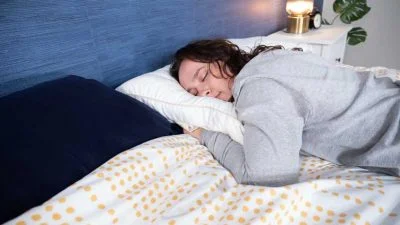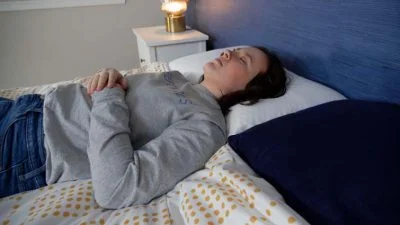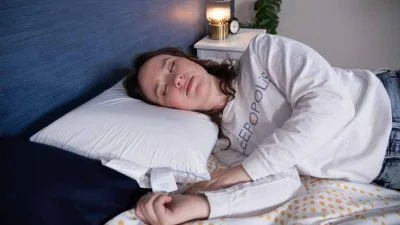Whether you’re camping in the forest or snuggling up for a late-night movie in bed, most of us consider our pillows a must-have. However, people didn’t always sleep with pillows, and you have to wonder if they knew what they were missing. On the other hand, maybe they were onto something. Could sleeping without a pillow actually be better for you?
The answer is more complicated than you think. From spinal alignment to wrinkle prevention, ditching the pillow definitely has its perks, but it also has its pitfalls. Below, we’ve outlined all the factors to consider if you’re thinking about going pillow-free.
Long Story Short
- Sleeping without a pillow may promote natural spine alignment, reduce neck and back pain, and help prevent wrinkles by reducing facial pressure.
- Some people might find that sleeping without a pillow improves breathing and reduces snoring, while others with conditions like sleep apnea may experience worsened symptoms.
- Stomach sleepers may benefit the most from sleeping without a pillow, whereas back and side sleepers might experience discomfort or neck strain without proper head support.
- Before deciding to sleep without a pillow, weigh the pros and cons carefully, and if you choose to try it, allow your body time to adjust gradually to see if it suits your needs.
Note: The content on Sleepopolis is meant to be informative in nature, but it shouldn’t be taken as medical advice, and it shouldn’t take the place of medical advice and supervision from a trained professional. If you feel you may be suffering from any sleep disorder or medical condition, please see your healthcare provider immediately. Additionally, restrictions and regulations on supplements may vary by location. If you ever have any questions or concerns about a product you’re using, contact your doctor.
Potential Benefits of Sleeping Without A Pillow
Is it better to sleep without a pillow? Depends on who you ask, but research suggests that if you wake up without one between your head and the mattress, it might be a nice reprieve for your body. Whether you already sleep without a pillow or are curious about trying it, here are some of the potential benefits it might offer.
Improved Spinal Alignment
Sleeping without a pillow may help optimize your spinal alignment, especially for our stomach-sleeping friends. Don Beasley, MD, otolaryngologist and owner at Boise ENT tells Sleepopolis, “For stomach sleepers, ditching the pillow could be incredible — it keeps your head and neck aligned nicely.”
When you fall asleep on your stomach, keeping a pillow under your head often forces your neck into an unnatural, and straining, angle. Without a pillow, your head can stay closer (or right on) the mattress, which promotes a more neutral, natural spinal alignment. Overall, a neutral spine helps reduce the risk of neck discomfort and alleviates pressure on your upper spine.

Reduced Neck and Back Pain
By neutralizing your spine, ditching your pillow may also be especially helpful for those dealing with certain types of existing neck and back pain.
Beasley says that going pillow-free can help keep your neck and spine aligned, which could prevent neck pain: “This alignment occurs because your neck isn’t forced into an awkward upward tilt, which is usually the case with pillows. It might even ease some of the tension in your upper back and shoulders.”
In short, if you’re a stomach sleeper, removing the pillow between your head and mattress can reduce extra pressure on your upper back and neck.
Back sleepers may also find going sans pillow to be more comfortable. Lying your head on a flat surface helps minimize how much your head tilts forward, which can otherwise compress your neck and promote spinal misalignment that may be contributing to existing pain.

Prevents Wrinkles and Supports Hair Health
Sleeping without a pillow isn’t some kind of ancient secret to youthfulness, but there is some evidence that it may help reduce the development of facial wrinkles. (1)
Think about how your face normally ends up while sleeping. At least sometimes, you’d probably describe it as totally smashed, as evidenced by the sheet lines left on your forehead in the morning. Removing your pillow can help minimize skin compression, possibly contributing to fewer fine lines over time.
Those who deal with acne may also benefit from pillow-less sleeping, as it can reduce friction and the buildup of bacteria that probably lives on your pillowcase (take this as your reminder to wash your bedding this weekend). (2)
Finally, sleeping without a pillow may theoretically help prevent hair breakage and reduce tangling, as your hair is less likely to be pressed and rubbed on as much fabric. However, there’s not a lot of research yet on this topic.
Improved Breathing and Reduced Snoring
Going without a pillow may help improve your breathing at night by keeping your airway more open. This, in turn, may be beneficial for snorers who are looking to quit.
Lizzie Benge, MD, sleep medicine physician and a faculty member at Harvard Medical School’s Division of Sleep and Circadian Disorders, says that for back sleepers, sleeping flat may promote an open airway, which might help reduce snoring in some cases. This is because, if you sleep on your back, a pillow often tilts your head forward, which can make your airway more narrow and lead to disrupted breathing — and probably more snoring.
If you prefer a pillow and are a snorer, though, some research suggests that lying at an incline may also help. (3)
Eases Tension Headaches
If you experience tension headaches, sleeping without a pillow may help promote proper neck and spinal alignment that reduces underlying pressure. Thick or overly soft pillows, while cushioning and comfortable, might push the neck into unnatural positions, causing muscle strain that can lead to morning headaches.
Without a pillow, the head rests in a more neutral position, reducing stress on the cervical spine and surrounding muscles. This minimizes tension in the neck and shoulders, which is a common trigger for tension headaches. (4)
Potential Drawbacks of Sleeping Without A Pillow
While sleeping without a pillow can benefit some, it may lead to poor posture and spinal alignment, worsened existing pain, and disruptive sleep problems for others. Here are some of the potential downsides to ditching your pillow.
Poor Posture and Spinal Alignment
Without a pillow, the head may tilt downward, causing misalignment between the head, neck, and spine. This misalignment can strain the neck and shoulder muscles, resulting in discomfort.
Therefore, Benge says, “Pillow use is generally recommended for side sleepers to keep their neck aligned with their spine.” (5)

For back sleepers, going pillow-free can sometimes allow the head to fall too far back, disrupting the natural curvature of the spine and placing pressure on the cervical area. In these cases, using a supportive pillow that’s tailored to your preferred sleeping position may be an essential component of supporting healthy spinal alignment.
Worsens Neck and Back Pain
Especially for side sleepers, sleeping without a pillow can make neck and back pain worse. Sleeping on your side requires your head to be supported at a height that aligns with your spine to prevent pain. So, when there’s no pillow support there, your head is more likely to fall toward your mattress and place strain around your neck and cervical spine.
Back sleepers might also find it uncomfortable if their head falls too far back without pillow support, as this can also disrupt the spine’s natural curve.
Exacerbates Acid Reflux and Sleep Apnea Symptoms
For those with sleep apnea or acid reflux, not sleeping with a pillow may worsen certain symptoms. This is because a pillow provides a slight elevation of your head and neck, which helps keep your airways open and reduces the likelihood of interrupted breathing while you’re asleep. (6)
If you have acid reflux, keeping your head at a slightly elevated angle at night can help prevent stomach acid from flowing back up into your esophagus and causing a burning sensation. (7) If it’s sleep apnea you suffer from, sleeping without that slight angle may increase the risk of airway collapse and further trouble breathing. (8)
How To Sleep Without A Pillow
So you want to try sleeping without a pillow. But before you toss it into the donation bin, remember that pillow-less sleeping isn’t for everybody, and it can take some time to get used to.
It can be helpful to start by gradually reducing your pillow thickness to ease your body into the change. If you’re accustomed to a thicker, fluffier pillow, transition to a thinner pillow first — or even a folded towel — to maintain some of the support you’ve had. Over the coming days or weeks, as it feels appropriate, you can continue to make it thinner or flatter.
You might also experiment with different sleeping positions to find what feels best without a pillow. Stomach sleepers often adjust most easily, as this position aligns naturally without head elevation. Back sleepers should focus on maintaining the natural curve of the spine, possibly by placing a small rolled towel under the neck for support. Side sleepers may find going pillow-free challenging, so they should consider supporting the head with a very thin cushion to keep it aligned with the spine.
There’s no one right way to approach sleeping without a pillow. What’s most important is finding what works for you (or doesn’t). Pay attention to how your body feels and adjust accordingly. If you experience discomfort or misalignment, you might need minimal support to maintain comfort. Pairing pillow-free sleep with a firmer mattress can also enhance proper spinal alignment. (9)
Who Shouldn’t Sleep Without A Pillow
Sleeping without a pillow isn’t ideal for everyone, especially if you have certain medical conditions or sleep preferences. For example, people with acid reflux may find pillow-free sleeping uncomfortable, as lying flat may worsen symptoms of acid regurgitation at night. Similarly, those with sleep apnea often benefit from slight head elevation to keep airways open and reduce breathing disruptions.
Of all the sleeping positions, side sleepers typically need a pillow most to maintain proper spinal alignment. Without one, the head may tilt downward, leading to neck and shoulder strain. Back sleepers may also struggle without a pillow, as the lack of support can disrupt the natural curve of the neck and upper spine, causing discomfort.
If you have chronic neck or back issues, suddenly deciding to toss your pillow may not be the best idea. Beasley says that if pain, snoring, or other sleep troubles are part of your nightly schedule, it’s a smart move to rethink your sleep setup: “I always recommend touching base with a health pro to find the perfect pillow for the way you sleep.”
The Last Word From Sleepopolis
Should you try sleeping without a pillow? While we can’t answer that definitively for you, we know that there are potential benefits to going pillow-less, especially if you’re a stomach sleeper. Side and back sleepers are more likely to experience changes in head and neck position without a pillow that are uncomfortable. However, if you feel good sleeping without a pillow, you might also reap benefits of fewer facial wrinkles over time, easing tension headaches, and improved spinal alignment.
FAQs
Is it better to sleep without a pillow?
Whether it’s better to sleep without a pillow depends on your sleeping position and individual needs. While stomach sleepers may benefit from better spinal alignment without a pillow, side and back sleepers often require some support to prevent neck and spine strain. (10)
What should you consider before sleeping without a pillow?
Before sleeping without a pillow, consider your sleep position, as side and back sleepers may need a pillow for proper alignment. Additionally, if you have any medical conditions like acid reflux or sleep apnea, these often require slight head elevation for symptom relief.
Is sleeping without a pillow bad?
Sleeping without a pillow isn’t inherently bad but it may lead to discomfort or poor alignment for certain people. For side and back sleepers, or those with specific health concerns, a lack of support can strain the neck and spine.
Is it safe to sleep without a pillow?
Yes, it’s generally safe for those whose sleep positions align naturally without a pillow, such as stomach sleepers. However, it may not be ideal or comfortable for everyone, particularly if proper alignment is compromised. If you’re concerned about sleeping without a pillow but want to try it, consult a healthcare provider for personalized advice.
Sources
- Anson G, Kane MA, Lambros V. Sleep Wrinkles: Facial Aging and Facial Distortion During Sleep. Aesthet Surg J. 2016 Sep;36(8):931-40. doi: 10.1093/asj/sjw074. Epub 2016 Jun 21. PMID: 27329660. https://pubmed.ncbi.nlm.nih.gov/27329660/
- Hickman, K. (2024). Here’s What Happens if You Don’t Wash Your Pillowcase—and It’s Disgusting. Reader’s Digest. Retrieved from: https://www.rd.com/article/what-happens-if-you-dont-wash-your-pillowcase/
- Danoff-Burg S, Rus HM, Weaver MA, Raymann RJEM. Sleeping in an Inclined Position to Reduce Snoring and Improve Sleep: In-home Product Intervention Study. JMIR Form Res. 2022 Apr 6;6(4):e30102. doi: 10.2196/30102. PMID: 35384849; PMCID: PMC9021938. https://pmc.ncbi.nlm.nih.gov/articles/PMC9021938/
- Chun-Yiu JP, Man-Ha ST, Chak-Lun AF. The effects of pillow designs on neck pain, waking symptoms, neck disability, sleep quality and spinal alignment in adults: A systematic review and meta-analysis. Clin Biomech (Bristol). 2021 May;85:105353. doi: 10.1016/j.clinbiomech.2021.105353. Epub 2021 Apr 19. PMID: 33895703. https://pubmed.ncbi.nlm.nih.gov/33895703/
- Tian S, Yao C, Wang Y, Cao X, Sun Y, Wang L, Fan Y. The individualized optimal pillow height and neck support design for side sleepers. Med Biol Eng Comput. 2024 Oct 16. doi: 10.1007/s11517-024-03204-x. Epub ahead of print. PMID: 39412632. https://pubmed.ncbi.nlm.nih.gov/39412632/
- Lei JX, Yang PF, Yang AL, Gong YF, Shang P, Yuan XC. Ergonomic Consideration in Pillow Height Determinants and Evaluation. Healthcare (Basel). 2021 Oct 7;9(10):1333. doi: 10.3390/healthcare9101333. PMID: 34683013; PMCID: PMC8544534. https://pubmed.ncbi.nlm.nih.gov/34683013/
- Albarqouni L, Moynihan R, Clark J, Scott AM, Duggan A, Del Mar C. Head of bed elevation to relieve gastroesophageal reflux symptoms: a systematic review. BMC Fam Pract. 2021 Jan 19;22(1):24. doi: 10.1186/s12875-021-01369-0. PMID: 33468060; PMCID: PMC7816499. https://pubmed.ncbi.nlm.nih.gov/33468060/
- Lukachan GA, Yadollahi A, Auckley D, Gavrilovic B, Matelski J, Chung F, Singh M. The impact of semi-upright position on severity of sleep disordered breathing in patients with obstructive sleep apnea: a two-arm, prospective, randomized controlled trial. BMC Anesthesiol. 2023 Jul 13;23(1):236. doi: 10.1186/s12871-023-02193-y. PMID: 37443016; PMCID: PMC10339502.https://pubmed.ncbi.nlm.nih.gov/37443016/
- Caggiari G, Talesa GR, Toro G, Jannelli E, Monteleone G, Puddu L. What type of mattress should be chosen to avoid back pain and improve sleep quality? Review of the literature. J Orthop Traumatol. 2021 Dec 8;22(1):51. doi: 10.1186/s10195-021-00616-5. PMID: 34878594; PMCID: PMC8655046. https://pubmed.ncbi.nlm.nih.gov/34878594/
- Radwan, A., Ashton, N., Gates, T., Kilmer, A., & VanFleet, M. (2021). Effect of different pillow designs on promoting sleep comfort, quality, & spinal alignment: A systematic review. European Journal of Integrative Medicine, 42, 101269. https://doi.org/10.1016/j.eujim.2020.101269 https://www.sciencedirect.com/science/article/abs/pii/S1876382020314505
- Beasley, Don. Personal interview. December 6, 2024.
- Benge, Lizzie. Personal interview. December 6, 2024.


























